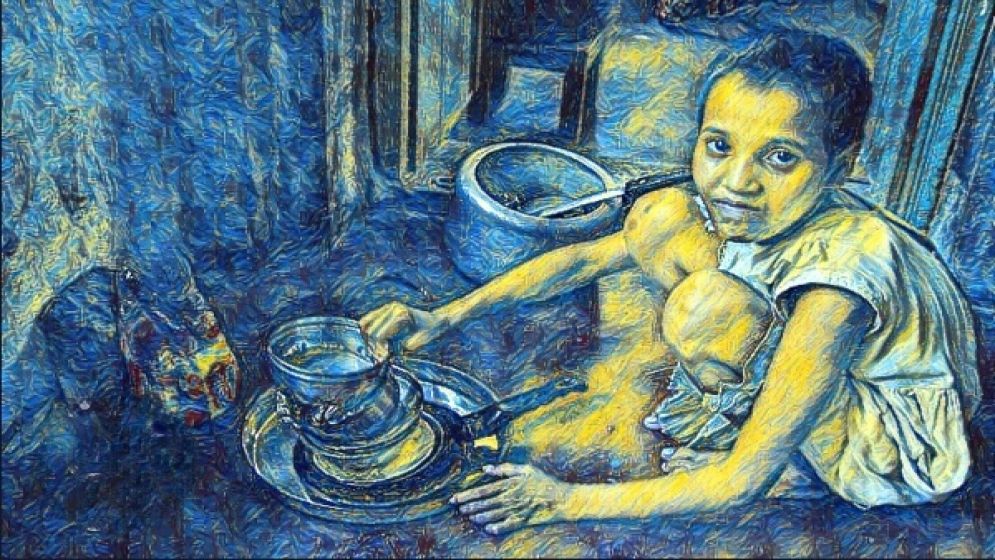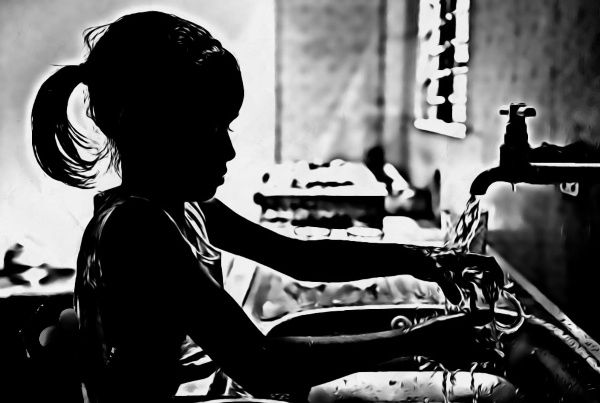Child Labor, Syed Ashfaq’s bail and a culture of impunity

Today is the World Day Against Child Labor, and as is my habit, I checked The Daily Star (Bangladesh's newspaper of record) for relevant coverage in the morning. Given that established newspapers often publish articles on UN-recognized days, I was surprised not to find anything in the paper about this important issue.
One particular one-column news at page three (no pun intended) however caught my attention: “Syed Ashfaqul Haq gets bail”--said the headline.
That news, well, isn't exactly related with Child Labor day, but if someone wants to make a connection between the two, that too will not be far-fetched as well.
Syed Ashfaq, a veteran journalist was the former Executive Editor of The Daily Star and he, along with his wife Tania Khondoker went to jail in early February after a 15-year old housemaid named Preeti Urang died in his house under unusual circumstances.
Preeti, a member of the Urang tribe from Moulvibazar, who typically worked in the tea gardens for minimal wages, was employed as a domestic worker at the residence of Ashfaqul. On February 6, she fell from his eighth-floor apartment and died.
Disturbingly, a similar incident occurred at Ashfaqul's Mohammadpur residence on August 6 of the previous year, where a nine-year-old domestic worker named Ferdousi suffered severe injuries after jumping from the same window in the building.
Following Preeti's death, local residents in Mohammadpur staged protests outside Ashfaqul's residence, alleging foul play. The recurring nature of such an unusual incident involving a well-known journalist and his family sparked widespread outrage on social media, prompting police intervention and the couple's subsequent arrest.

Notably, Ashfaqul faced no legal repercussions after the Ferdousi incident. In fact, a Dhaka court acquitted the former Daily Star Executive Editor and his wife of charges related to Ferdousi's fall on February 24.
Although the case involving two child laborers employed at the home of the former newspaper executive editor is ongoing and lacks definitive evidence against the couple, the allegations against them are not entirely unfounded.
Media reports surrounding the mysterious incidents, despite the newspaper's stance against child labor, raise concerns due to the circumstances surrounding the case.
Numerous local media outlets and television channels ran extensive reports, revealing how the couple leveraged their influence to suppress the case involving Ferdousi, promising financial compensation for case withdrawal, which was never delivered.
Despite significant public outcry on social media, both Tania and Ashfaqul have been granted bail in the Preeti case. Tania received bail in mid-April, followed by Ashfaqul yesterday.
It's important to note that applying for bail is a legal right, regardless of the severity of the alleged crime. Their bails were granted after the High Court questioned why they should not be released on bail.
It's highly probable that this marks the end of the couple's imprisonment even though the chargesheet hasn't been filed and the case remains open. Besides, unlike the Ferdousi case, Ashfaqul and Tania haven't been acquitted in the Preeti case.
However, examining past instances of child domestic worker abuse reveals a lack of severe punishment for such crimes.
In July, 2021 a post in a Facebook group called “We Are Bangladesh” with more than 700,000 members gave vivid details of how a couple on Dhaka’s Topkhana Road had brutally tortured their 12-year-old domestic worker. The post had six photos showing the horrific injuries on the girl’s body.

That couple was later released within the
next six months--first the wife– Nahid Jahan Akhi, a lawyer, and then the
husband– Tanvir Ahsan Siddiqui, a mid-level employee of a multinational
company, mirroring the pattern of Ashfaqul’s case.
Tanvir and Nahid's case resulted in their acquittal, and they are now doing well. Similar to Ashfaqul's experience of losing his job at The Daily Star, Tanvir also lost his position at the multinational company.
However, as a graduate of the prestigious Institute of Business Administration (IBA), Tanvir quickly secured another well-paying job. The tortured domestic help however has lost into obscurity.
This is the outcome of hundreds of such incidents and ironically, no updated or reliable data is available about the child domestic worker’s abuses.
An older study by the Ain o Salish Kendra reported 2,709 incidents of violence against domestic workers between 2008 and 2011, including 729 deaths of children.
Furthermore, a survey by the Bangladesh Bureau of Statistics and UNICEF estimated there are about 400,000 child domestic workers aged 6-17 in Bangladesh, mainly from rural areas and sent to cities by their impoverished families to earn income.
Due to their isolation within their employers' households and separation from their families, child domestic workers in Bangladesh are largely hidden from public view. This makes them inaccessible to government officials, researchers, NGO workers, and even neighbors.
This invisibility contributes to their vulnerability to exploitation, as they are often excluded from legal protections due to their informal employment status.
Yusuf Al Mamun of Bangladesh Institute of Labor Studies noted a striking pattern in their research of domestic child worker abuse. They discovered that in most domestic help abuse cases, the victims either retracted their complaints or the police failed to charge the abusers.
This is because the victims' families, often impoverished, lacked the courage or means to pursue legal action against the employers. And that keeps running this vicious cycle of impunity.
—
Harun Ur Rashid is a journalist

